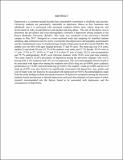Prevalence and socio-demographic correlates of depression among students at the Kenya Methodist University
Abstract
Depression is a common mental disorder that considerably contributes to disability and suicides. University students are particularly vulnerable to depressive illness as they transition into adulthood, and it is associated with increased academic failure rates, school drop-out, and involvement in risky sexual behavior and alcohol and drug abuse. The aim of this thesis was to determine the prevalence and socio-demographic correlates f depression among students at the Kenya Methodist University (KeMU). This study was conducted at the university’s Nairobi campus in May 2017. Designed as a cross-sectional study and sampling by stratified random sampling, data collection used two tools: a researcher developed socio-demographic questionnaire and the standardized Center for Epidemiologic Studies Depression Scale Revised (CESD-R). The sample size was 404, with ages ranging between 17 and 54 years. The mean age was 25.4 years, median 23 and mode 20 year. 42.7% of the students were male, and 57.3% female. 50.5% were in 1st year, 17.8% in 2nd, 18.8% in 3rd and 12.9 in their 4th year of study. 20.3% were postgraduate and 79.7% undergraduate. 60.4% were full-time students, while 39.6% were part-time students. This study found a 24.26% prevalence of depression among the university students, with 16.3% having mild, 5.4% moderate and 2.5% severe depression. The socio-demographic factors found to be associated with depression among the students were illicit drug use (p=0.004), poor academic performance (p=<0.001) and self-financing (p=0.039). The student’s mode (p=0.002) and level of study (p=0.023) were also found to be significantly associated with depression. Age, gender and year of study were not found to be associated with depression (p>0.05). Recommendations made from the study findings include increased awareness of depressive symptoms among the university students, better mechanisms to identify depression early and clear channels of intervention. Further research recommended into the factors found to be associated with depression, and the consequences of depression.
Publisher
KeMU
Subject
Public HealthDescription
A thesis submitted in partial fulfillment of the requirements for the degree of Master of Public Health (MPH) of Kenya Methodist University.

